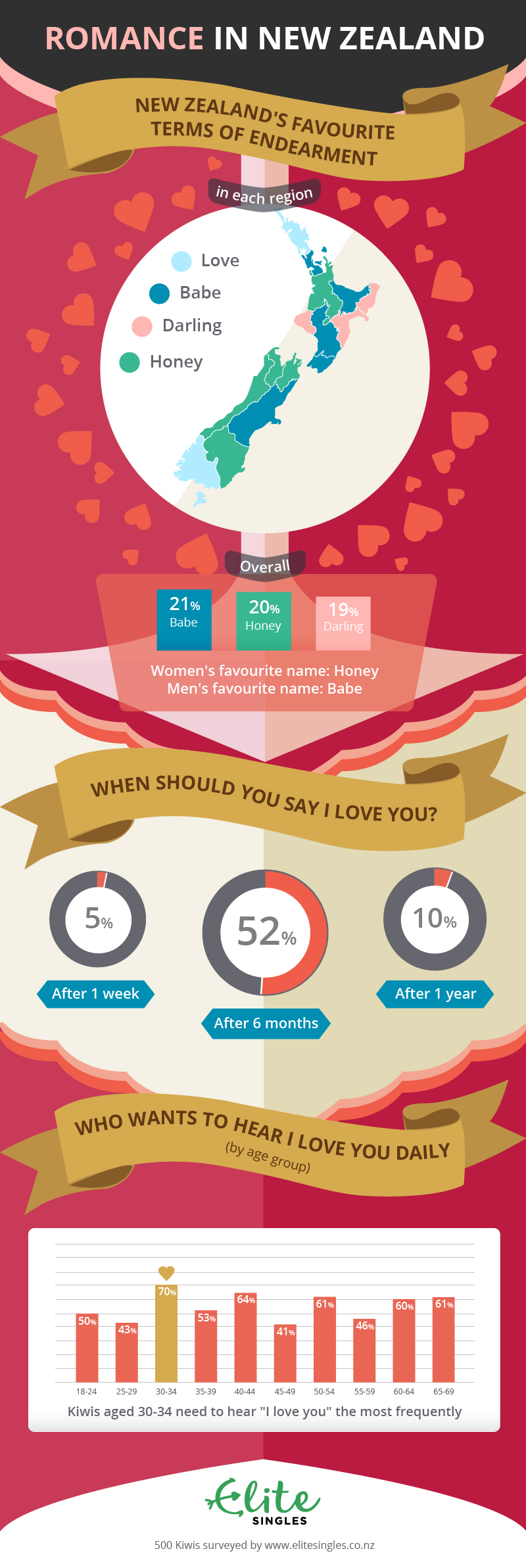Have you ever written a love letter? If so, you're not alone: our newest survey has revealed that new Zealanders are in love with love letters - and that more…
In Japan, you’re an egg with eyes (tamago gata no kao). In Spain, you’re a lump of sugar (terron de azucar). Meanwhile, in Russia you’re a little dove (golubchik/golubushka), in France a little cabbage (petit chou) and in Thailand a little elephant (chang noi).¹ Every culture has their favourite terms of endearment and, as it turns out, NZ is no exception.
In fact, our latest survey has uncovered the top pet names in the country. Kiwi terms of affection may not be as poetic as those above but our survey showed that they’re still popular: if you’re a honey, a babe, a darling, or a love, there’s a region of NZ that speaks your name.
Cute nicknames and mushy monikers: NZ’s top pet names
The study asked 500 Kiwis aged 18-70 to vote for their favourite term of endearment. As it turned out, the top pet name in NZ is ‘babe’ or ‘baby’ – 21% of us opt for this when in need of a cute nickname.2
Babe did have some fierce rivalry however, notably from ‘honey’ which took 20% of the vote and from ‘darling,’ which earned 19%. Rounding out the top five nicknames were ‘sweetheart,’ with 15% and ‘love’ with 10%.
However, it’s not the same in every part of the country. In fact, the fondness for babe might just be a big city thing: four out of our five biggest cities (Auckland, Tauranga, Wellington and Christchurch) are found in ‘babe’ regions. Smaller cities, more rural areas and Hamilton tend to favour either honey or darling (with darling more popular in the North Island and honey in the South Island), while at the tips of the country, it’s all about love – the top nickname in both Northland and Southland.
Name: Most popular in:
Babe Auckland, Bay of Plenty, Manawatu-Wanganui, Wellington, Canterbury
Honey Waikato, Malborough, Nelson, Tasman, the West Coast, Otago
Darling Gisborne, Hawke’s Bay, Taranaki
Love Northland, Southland

Love gets sweeter every day
Not all terms of endearment revolve around cute nicknames and there’s one particular expression of affection that is more simple: ‘I love you.’ Our survey also looked at how often New Zealanders want to hear these three little words – and it turns out that we are a relatively affectionate bunch, with 55% of us wanting to hear ‘I love you’ on a daily basis.
Interestingly, when a similar study was run by EliteSingles in other countries, this 55% result put us right in the middle of the pack: more or less equal to Australia (where 58% want to hear ‘I love you’ every day) and well ahead of singles in Europe (where just 24% want the same). However, North Americans singles leave us all behind – 66% of Canadians and 73% of Americans want a daily dose of ‘I love you.’3
Of course, not all Kiwis want to hear ‘I love you’ every day and, in fact, the desire can change with age. At 25, for instance, just 43% of us would like to hear the l-word daily; by 30, that number has jumped to 70% (making 30-34 year olds the most affectionate in the country).
EliteSingles psychologist Salama Marine thinks that this early-thirties need for affection might have something to do with the fact that these years are often the ones in which people start feeling an overwhelming need for security and stability: ”Between 30 and 34 many people are getting married or starting to build a family with their partner. It’s always during these periods of big change –wedding, children, etc – that people need reassurance that they’re making the right decisions, that everything is completely fine. Hearing ‘I love you’ is helpful for that!”4
Timing is everything
Your terms of endearment might be greatly appreciated by the object of your affection – but, as with all things love-related, success on this front comes down to having the right timing. Indeed, another aspect of the survey was finding out the right timing for the first ‘I love you’ – how long into a relationship should you wait before dropping the l-word?
For most Kiwis, the answer is six months. 52% of New Zealanders think that you must wait six months at least before your conversations lightly turn to thoughts of love. In comparison, 10% of us think that even six months is too soon – they’d rather wait a minimum of one year before admitting to being in love. And a further 5% have no such reservations: they’d be happy to say ‘I love you’ after dating for just a week.
Whether you want to hear it daily or not, are you searching for someone who is going to say ‘I love you’? EliteSingles can help – register today to meet truly compatible Kiwi singles.
EliteSingles Editorial April 2016
Do you have a favourite term of endearment or cute nickname that we’ve missed? Let us know in the comments below, post on our Facebook or write us an email at [email protected]
Sources:
1 Languages of love: 10 unusual terms of endearment. From the BBC magazine, 2013. Found at http://www.bbc.com/news/magazine-22699938
2 All NZ statistics are from a 2016 EliteSingles survey about romance. Sample size: 500 Kiwis aged 18-70.
3 Global statistics from a 2015/2016 EliteSingles survey about romance. Sample size: 12,654 men and women from 20 different countries.
4 Quote from an exclusive EliteSingles interview with Salama Marine, April 2016.





